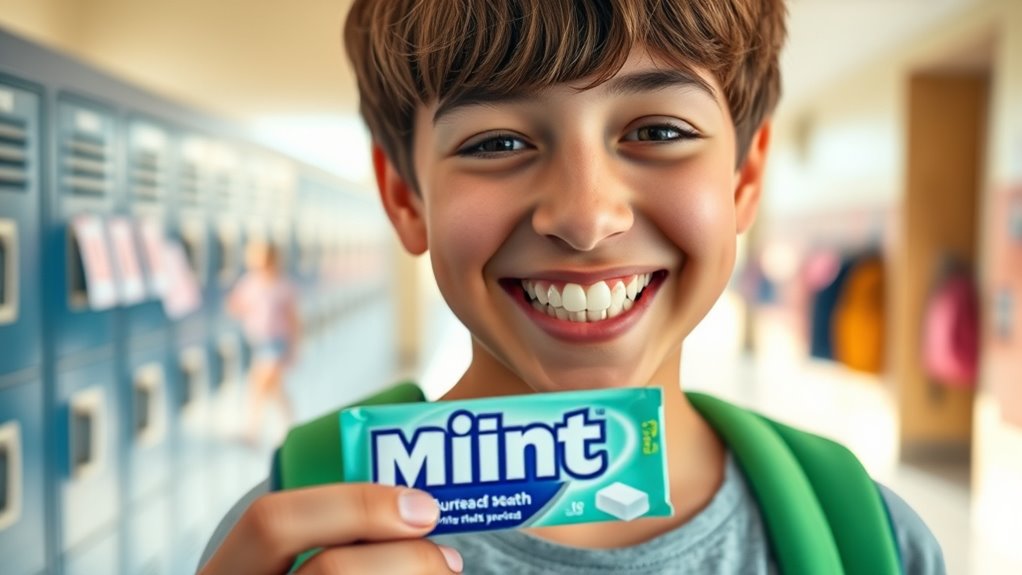To keep your breath fresh for school, try quick fixes like chewing sugar-free gum or mints with strong flavors, and stay hydrated with water, which washes away bacteria and food particles. Avoid relying solely on mouth rinses or brushing excessively, as they only offer temporary relief. Smarter habits like flossing and tongue cleaning boost freshness long-term. If you stay aware of common myths and proper routines, you’ll enjoy lasting confidence throughout the day.
Key Takeaways
- Chewing sugar-free gum or mints provides quick, portable freshening but doesn’t replace good oral hygiene for long-lasting results.
- Drinking water and rinsing with alcohol-free mouthwash help temporarily mask bad breath and support oral health.
- Proper brushing, flossing, and tongue cleaning are essential for maintaining fresh breath beyond quick fixes.
- Natural remedies like herbal teas and crunchy produce stimulate saliva and reduce odor-causing bacteria.
- Myths such as rinsing alone curing bad breath are false; consistent oral care and professional advice are necessary.
Common Quick Fixes for Fresh Breath

Ever wonder how to quickly freshen your breath before heading back to class? One simple trick is flavor masking—chewing gum or mints with strong, pleasant flavors can cover bad odors instantly. These products not only mask unpleasant smells but also boost your confidence. Another effective quick fix is saliva stimulation; chewing sugar-free gum or sucking on hard candies encourages saliva production, which naturally washes away odor-causing bacteria. Increased saliva flow helps neutralize acids and freshens your mouth. Both methods are convenient, portable, and fast, making them perfect for short breaks between classes. Just remember, while these tricks can provide immediate relief, maintaining good oral hygiene is essential for long-lasting fresh breath.
The Truth About Mouth Rinses and Sprays

Mouth rinses and sprays can freshen your breath quickly, but they don’t address the underlying causes of bad odor. Their effectiveness is temporary, and overuse can sometimes cause dryness or irritation. To get lasting results, follow proper usage tips and consider other oral hygiene habits. Using products like mouth rinses should be complemented with regular brushing and flossing for better overall oral health.
Effectiveness and Limitations
While mouth rinses and sprays can provide a quick freshening of your breath, their effectiveness is often limited to short-term results. They mask breath odor temporarily but don’t address underlying oral health issues that cause bad breath. Rinses with alcohol or strong flavors may even dry out your mouth, making breath odor worse over time. Sprays can be convenient but don’t replace proper oral hygiene practices like brushing and flossing. Relying solely on these quick fixes can give a false sense of freshness, leaving deeper problems unaddressed. If you want lasting fresh breath, you need to focus on improving your oral health habits. Mouth rinses and sprays are tools for temporary relief, but they aren’t a substitute for regular dental care and good oral hygiene routines. Additionally, poor oral health can contribute to bad breath caused by bacteria buildup, highlighting the importance of comprehensive dental care.
Proper Usage Tips
To get the most benefit from mouth rinses and sprays, it’s important to use them correctly and follow the instructions carefully. Incorporate these products into your oral hygiene routines consistently, but don’t overuse them, as this can cause sensitivity or dryness. Always measure the recommended amount and avoid swallowing mouth rinses. When using breath freshening gadgets like sprays, aim for a quick, targeted spray rather than prolonged use, which can irritate your mouth. Remember, these are quick fixes, not replacements for brushing and flossing. Proper usage guarantees you maximize their effectiveness without harming your oral health. Keep in mind, healthy habits combined with correct application give you fresher breath and a more confident smile throughout the day. Using mouth rinses and sprays in restaurants or cafes can be especially helpful after meals to maintain freshness.
The Role of Chewing Gum and Mints

Chewing gum and mints can freshen your breath quickly when you need a boost. They also help stimulate your oral muscles, keeping your mouth feeling more alert. Next, let’s explore how these small solutions can make a big difference in your daily routine. Inspirational quotes about fatherhood remind us that small acts of care can have a lasting impact.
Freshens Breath Quickly
When you need a quick breath freshener, chewing gum and mints are your best options. They mask halitosis causes temporarily and provide immediate relief. To maximize effectiveness, consider these tips:
- Choose sugar-free gum or mints to avoid feeding bacteria that cause bad breath.
- Look for products with xylitol, which can help reduce bacteria naturally.
- Use them after meals or snacks to counteract natural remedies that might not be enough on their own.
Stimulates Oral Muscles
Although they quickly freshen your breath, chewing gum and mints also play an essential role in stimulating your oral muscles. Chewing encourages saliva production, which helps with tongue cleaning and keeps your mouth moist. This process not only fights dry mouth but also maintains overall oral health. To highlight this, consider the benefits in the table below:
| Benefit | Explanation |
|---|---|
| Tongue cleaning | Saliva helps wash away bacteria and debris on the tongue. |
| Saliva stimulation | Keeps your mouth hydrated, reducing bacteria buildup. |
| Muscle activity | Chewing exercises jaw and oral muscles, promoting strength. |
| Fresh breath effects | Continuous stimulation helps sustain fresh breath longer. |
Using gum or mints regularly can therefore support oral health beyond just freshening your breath. Additionally, oral muscle stimulation can contribute to better jaw function over time.
Why Water Is Your Best Friend for Bad Breath

Water plays an essential role in battling bad breath because it helps wash away food particles and bacteria that cause odor. Proper hydration importance means your mouth stays moist, reducing dry mouth that can lead to bad breath. Drinking water offers key water benefits, including:
- Flushing out bacteria and leftover food particles
- Stimulating saliva production, which naturally cleanses your mouth
- Keeping your mouth moist to prevent dry, odor-causing bacteria
- Supporting data privacy by maintaining a clean oral environment.
Debunking the Myth of Frequent Tooth Brushing as a Rapid Solution

Many people believe that brushing their teeth more frequently will quickly eliminate bad breath, but this isn’t always the case. Frequent brushing might temporarily mask odors, but it’s not a rapid solution for underlying issues. Overdoing it can even harm your gums and enamel, making bad breath worse in the long run. It’s a common misconception that more brushing equals fresher breath, but it often only removes surface particles without addressing bacteria or dry mouth causes. Instead, focus on thorough, gentle brushing twice a day combined with proper flossing and rinsing. These habits target the root problems more effectively than simply increasing brushing frequency. Additionally, understanding the role of oral health can help you develop more effective strategies for fresh breath. Remember, quick fixes like frequent brushing don’t provide lasting freshness and can sometimes do more harm than good.
The Impact of Diet and Snacks on Breath Freshness

What you eat and snack on throughout the day can substantially influence how fresh your breath feels. Your diet impact is real—certain foods can cause odor or mask it temporarily. Your snack choices matter too. Here are three key points:
Your diet and snacks greatly affect your fresh breath; choose wisely for lasting freshness.
- Sugary snacks create bacteria that produce foul smells.
- Citrus fruits and garlic can cause strong odors lingering in your mouth.
- Chewing sugar-free gum or munching crunchy vegetables helps stimulate saliva, which fights bad breath.
- Using natural remedies like herbal teas or mouth rinses can further aid in maintaining fresh breath throughout the day.
Choosing snacks wisely can make a difference. Avoid processed, sugary options that feed odor-causing bacteria. Instead, opt for fresh, crunchy produce or sugar-free gum to keep your breath fresh longer. Your diet impact on breath freshness is more powerful than you think—so pick your snacks carefully!
Myths About Oral Hygiene Products and Their Effectiveness

Although some believe that all oral hygiene products are equally effective, this isn’t true. Not all products provide the same benefits, and relying solely on mouthwash or toothpaste can be a mistake. Flossing benefits are often overlooked, but it’s essential for removing plaque and food particles between teeth where brushes can’t reach. Many think rinsing alone keeps their mouth clean, but tongue cleaning is equally important. A clean tongue helps eliminate bacteria that cause bad breath and improve overall oral health. Using a variety of products tailored to your needs ensures better results. Don’t fall for myths that any product can replace proper techniques like flossing and tongue cleaning. Effective oral hygiene involves a combination of tools and habits, not just one miracle product. Additionally, incorporating skincare patches, such as pimple patches, into your routine — although primarily used for skin — share the principle of targeted, strategic application to improve results.
When to Seek Professional Dental Advice

Knowing when to see a dentist is essential for maintaining good oral health. If you experience any of these signs, it’s time to seek professional advice:
- Persistent bad breath or unusual taste that doesn’t improve with home remedies
- Sudden tooth pain, swelling, or bleeding gums, which could indicate a dental emergency
- Visible damage such as cracked, chipped, or loose teeth
Ignoring these issues can lead to more serious problems and jeopardize your oral health. Regular check-ups help catch problems early and keep your mouth healthy. If you notice any of these warning signs, don’t delay—visit your dentist promptly to prevent complications and ensure your smile stays bright. Remember, timely professional care is crucial to avoiding dental emergencies and maintaining overall oral health.
Simple Daily Habits for Long-Lasting Fresh Breath

Maintaining fresh breath doesn’t have to be complicated; simple daily habits can make a significant difference. Incorporate effective oral health routines, like brushing your teeth twice a day and flossing daily, to remove food particles and plaque that cause odors. Use breath freshening techniques such as rinsing with an alcohol-free mouthwash or chewing sugar-free gum after meals to stimulate saliva production, which naturally cleanses your mouth. Staying hydrated throughout the day keeps your mouth moist and helps prevent dry mouth, a common cause of bad breath. Also, avoid strong-smelling foods and tobacco. Regularly practicing oral hygiene and being mindful of what you consume can enhance your confidence and contribute to overall well-being. Consistency is key—by making these habits part of your daily routine, you’ll enjoy long-lasting fresh breath and boost your confidence every day.
Frequently Asked Questions
Can Certain Medications Cause Persistent Bad Breath?
Certain medications can cause persistent bad breath due to their side effects, which often include dry mouth. This dry mouth impacts your oral health by reducing saliva, making it harder to wash away bacteria and food particles. As a result, you might notice bad breath that lingers. If you suspect your medication is affecting your breath, talk to your doctor or dentist, as they can suggest alternatives or remedies to improve your oral health.
How Does Nasal Congestion Affect Oral Breath Freshness?
When you have nasal congestion, sinus pressure can block airflow, making it harder to breathe through your nose. This often causes you to breathe through your mouth, which can lead to dry mouth and bad breath. Using nasal sprays may help reduce congestion, but if you don’t address the underlying sinus pressure, your oral freshness may suffer. Keep your nasal passages clear to maintain better breath throughout the day.
Are There Specific Foods That Permanently Improve Breath?
Did you know that certain foods can improve your breath permanently? While no food offers a magic fix, a balanced dental diet rich in crunchy fruits and vegetables can boost oral hygiene and reduce bad breath over time. Incorporate foods like apples, carrots, and leafy greens into your routine, and maintain good dental habits. These simple steps help keep your breath fresh long-term.
Does Tongue Cleaning Significantly Reduce Bad Breath?
Tongue cleaning can markedly reduce bad breath by removing oral bacteria that often hide on the tongue’s surface. When you regularly clean your tongue, you effectively decrease bacteria buildup, which is a common cause of bad breath. This simple habit enhances overall oral hygiene, helping to keep your breath fresh longer. So, yes, incorporating tongue cleaning into your routine can be a powerful way to combat persistent bad breath.
How Do Hormonal Changes Influence Breath Odor?
Imagine feeling confident, then suddenly noticing your breath changing—hormonal fluctuations can cause this. During pregnancy, you might experience halitosis due to increased hormones that dry out your mouth or alter bacteria. These shifts can make your breath smell different, even if your oral hygiene is on point. Recognizing that hormonal changes influence breath odor helps you understand and manage pregnancy halitosis better, easing your worries during this time.
Conclusion
Remember, achieving fresh breath isn’t about quick fixes alone; it’s about nurturing your oral harmony with gentle routines and mindful choices. While tempting shortcuts may offer fleeting comfort, true confidence comes from consistent care and understanding that some mysteries unfold gradually. Embrace simple habits daily, trust your body’s signals, and seek professional guidance when needed. In doing so, you’ll cultivate a subtle yet resilient freshness that quietly enhances your everyday moments.









